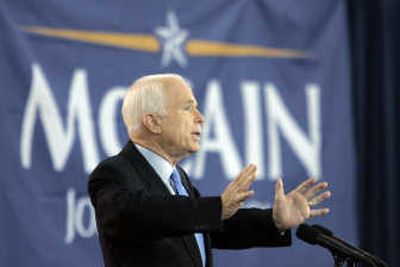McCain lays out economic plan

PITTSBURGH – Sen. John McCain outlined his agenda for reviving the nation’s troubled economy Tuesday with a mix of tax and spending cuts, starting with a summer-long suspension of federal gasoline taxes to ease the pain of soaring fuel prices.
His plan also includes a proposal that carries some political risk: an increase in the amount high-income elderly people would pay in premiums for the Medicare prescription-drug program.
McCain’s speech at Carnegie Mellon University here was his most sweeping presentation of the presidential campaign on how he would try to reverse the U.S. economic slowdown. It gave the presumptive Republican nominee a chance to express his vision for the economy – a topic that the Arizona senator previously acknowledged was not his strong suit but which voters consistently name as their top concern.
The thrust of McCain’s approach would be to limit the size of government, although he also recently proposed rescuing perhaps as many as 400,000 homeowners facing the threat of foreclosure.
Although the package of ideas drew support from some economists for its pledge to cut taxes and simplify the tax system, many analysts called the proposed holiday from the 18 cents-a-gallon gas tax a gimmick. Others questioned whether McCain’s plans would bloat the federal budget deficit.
McCain portrayed the Democratic Party’s White House contenders, Sens. Barack Obama of Illinois and Hillary Rodham Clinton of New York, as sorely lacking in fiscal restraint. At the same time, he hammered them for opposing a permanent extension of President Bush’s tax cuts.
“Both promise big change, and a trillion dollars in new taxes over the next decade would certainly fit that description,” McCain said. “Of course, they would like you to think that only the very wealthy will pay more in taxes, but the reality is quite different.”
When McCain voted against Bush’s tax cuts, he denounced them as a giveaway to the rich. But in his campaign for president, he has called for keeping them on the books – at an annual cost of $280 billion, aides say – rather than let them expire in 2010.
Beyond preservation of those cuts, McCain’s agenda calls for slashing the corporate income tax from 35 percent to 25 percent and banning new taxes on mobile phones and the Internet. He also would double a tax break for parents, increasing the exemption for dependents from $3,500 to $7,000.
McCain also called for abolishing the alternative minimum tax, a levy originally aimed at the wealthy but now increasingly hitting the middle class.
All told, the new tax cuts would put a $195 billion-a-year dent in the Treasury when fully phased in, but spending reductions would entirely offset them, McCain advisers said.
McCain also promised a “top-to-bottom review” of federal spending.
McCain’s fiscal blueprint drew scorn from the Clinton and Obama campaigns. Neera Tanden, policy director of the Clinton campaign, called it “a George Bush-redux of corporate windfalls and tax cuts for the wealthy that will bankrupt our government and leave working families with the bill.”
With family incomes on the decline and corporate profits on the rise, she said, “the last thing that hard-working families need is a president committed to slashing corporate taxes.”
Obama spokesman Bill Burton dismissed McCain’s agenda as an extension of “George Bush’s failed policies.”
The Club for Growth, an anti-tax group, welcomed most of McCain’s plan but criticized his proposal, released last week, to spend as much as $8 billion on efforts to keep homeowners from defaulting on mortgages that require sharply mounting monthly payments.
Absent from McCain’s speech was any pledge to wipe out the federal deficit. Asked about the omission a few hours later at Villanova University outside Philadelphia, McCain told reporters that he would balance the budget within eight years, a retreat from his previous vow to do so within four.
With Pennsylvania’s tightly contested Democratic primary a week away, McCain’s daylong visit gave him a burst of free media exposure in a state that will be a major battleground in the general election.
But the state’s relatively large population of elderly voters made it an odd setting for him to unveil his plan to reduce prescription-drug benefits for higher-income Medicare recipients.
For individuals who earn more than about $80,000 a year – or couples earning roughly $160,000 – the $35 monthly premium for medicine coverage would rise. The schedule of how the increases would be phased in had not been set.
The other attention-grabbing proposal McCain released Tuesday – relief from federal gasoline taxes from Memorial Day until Labor Day – would cost the Treasury $8 billion to $10 billion, aides said. Prospects for quick passage of that tax break in a House and Senate controlled by Democrats appeared bleak.